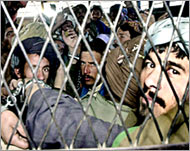Pakistan: Sanctuary for al-Qaida
Members of Afghanistan’s ousted Taliban government and al-Qaida network are using Pakistan as a sanctuary, the US ambassador to Afghanistan said on Wednesday.

Speaking at a police graduation ceremony, Zalmay Khalilzad said senior al-Qaida members including Usama bin Ladin, his deputy Ayman al-Zawahri and Taliban leader Mullah Muhammad Umar had to be brought to justice.
Khalizad said Umar and Afghan commander Gulbuddin Hekmatyar had to be brought to justice too.
“The remnants of extremist Taliban, al-Qaida and Hekmatyar want to take Afghanistan to the bad old days,” Khalilzad said. “They use Pakistan as a sanctuary”, he added.
Hiding
The fate of bin Ladin and al-Zawahri remains unknown, but they are widely believed to be hiding along the rugged Afghan-Pakistan border.
 |
|
Suspected Taliban fighters |
Afghan officials have long complained Pakistan is not doing enough to clamp down on fighters using its territory to launch raids into Afghanistan.
US officials are usually less forthright, recognising the importance of Pakistani President Pervez Musharraf’s support for the US-led “war on terror.”
Pakistan has arrested hundreds of suspected fighters, including senior figures in al-Qaida network and handed many over to US authorities, but senior officials say some men could still be hiding out along its remote Afghan frontier.
Training
Despite a 12,000-strong US army presence in Afghanistan and 5700 international peacekeepers in Kabul, more than 400 people have been killed since early August in a wave of violence, blamed on the to armed fighters.
Khalilzad said Afghanistan’s national army would increase at 10,000 recruits a year and the United States had committed
to help train 20,000 Afghan policemen “by the end of next summer”.
Training centres for police officers were being set up in cities around the country, Khalilzad said. But he warned the
central government did not control many heavy weapons, which are still held by fighters across the country where Karzai’s control is weak.
Khalilzad said the “enemies of Afghanistan” were losing, pointing to the recent deployment of a new civilian-military team to the southern city of Kandahar, the opening of a highway linking Kandahar to the capital and the opening of a
constitutional Loya Jirga, or Grand Assembly in Kabul.